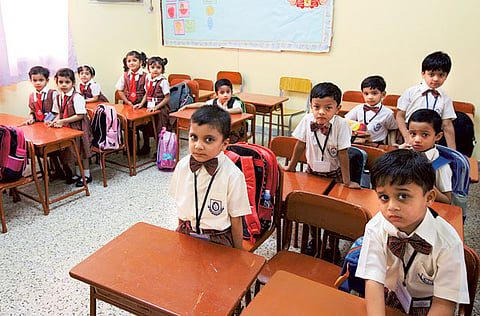Minimum school age adjusted to 3 years and 8 months
New regulations urge schools not to fail pupils enrolled upto Grade 5

Abu Dhabi: Children below the age of three years and eight months in the emirate of Abu Dhabi can no longer be admitted to KG 1 from the start of the 2014-2015 academic year, education authorities said in the capital on Sunday.
The rule readjusts the minimum age of admission, which was earlier set at three years for KG 1 and equivalent grades. The standard was first introduced in February as part of the Abu Dhabi Education Council’s (Adec) Organising Regulations for Private Schools, and it was reinforced on Sunday at a conference held to familiarise private school leaders with the rules.
“The minimum age aligns Abu Dhabi schools with international practices. Parents can enrol younger children in playschools or nurseries,” an Adec official told Gulf News on the sidelines of the conference.
There are currently 184 private schools in the emirate of Abu Dhabi, and they admitted more than 202,000 pupils between them during the 2012-2013 academic year. A total of 14 different curricula are offered at present, including British, American, Indian, Pakistani, Bangladeshi, French and Japanese systems.
Today’s meeting saw more than 350 school leaders in attendance, and the standard regarding the minimum age of admission garnered mixed reactions from them.
“Every year, we enrol a significant number of three-year-olds into KG 1. Many of the children have parents who both work,” said Mahdi Anis, principal at the Emirates Education Academy in the Western Region town of Madinat Zayed.
“Given the new regulation and the shortage of nurseries in the town, it will be difficult for these parents to make other arrangements for their children while they are at work. Leaving children at friend’s homes is an option, but most parents do prefer to have their children in a safe setting like a school,” he added.
Samia B, a Lebanese parent in the capital, also said that she hoped it would not mean that children were delayed from entering school.
“What if the child is a few months younger than the minimum age? Not allowing them to enrol at the time could mean that the he or she is much older than all their classmates when they finally gain admission a year later. This can be rather unpleasant for children,” Samia said.
But other school leaders said that they had been aware of the regulations, and that it followed standard practices in other countries.
“It is not a difficult decision to implement, and this is the minimum age in a lot of other countries across the world,” said the principal at a newly opened primary school in the capital.
“However, there are parents who are not happy to enrol their children into Foundation Stage 1, our pre-school grade, mainly because they feel that children do not learn much. This is the wrong idea, and this might be something we have to work on as we implement the standards,” she said.
A host of other regulations were also discussed at the conference, including one that prevents children from being retained in grades lower than Grade 5.
“Upto Grade 5, schools cannot fail pupils. Instead, they must support pupils who are not performing well,” Dr Georges Nader, manager of the Licensing and Accreditation at the Adec, said at the conference.
He also urged schools to review their promotion and retention policies in case children have been retained so far.
“This is a very positive decision, because parents need to feel motivated enough to succeed later in life. Schools can definitely work to help children perform better instead of failing them,” Anis said.



